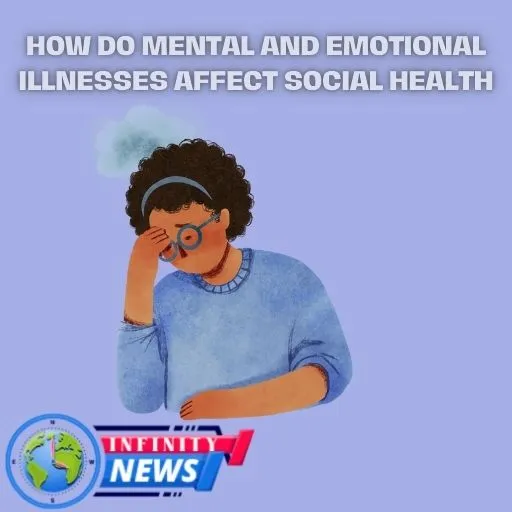Introduction: how do mental and emotional illnesses affect social health
how do mental and emotional illnesses affect social health refer to conditions a person’s thoughts, emotions, and behaviors. Common disorders include anxiety, depression, bipolar disorder, and PTSD, all of which can impact daily life and relationships.

Social health, an essential aspect of overall well-being, refers to our ability to build and maintain positive relationships. When mental health is compromised, it often leads to social withdrawal, difficulty communicating, and strained relationships with family, friends, and colleagues.
For example, someone experiencing depression may struggle with feelings of hopelessness, making it difficult to engage in meaningful conversations. Similarly, anxiety disorders can cause excessive worry, making social interactions overwhelming. These challenges often lead to isolation, loneliness, and low self-esteem, further worsening mental health.
Understanding the relationship between mental health and social well-being is crucial. Addressing mental and emotional illnesses through therapy, support groups, or lifestyle changes can improve social connections and overall quality of life. In the following sections, we will explore how different mental illnesses impact social health and what can be done to create healthier, more supportive relationships.
The Social Impact of Mental and Emotional Illnesses: How Do Mental and Emotional Illnesses Affect Social Health
Mental and emotional illnesses like anxiety, depression, and stress disorders can deeply affect how individuals interact with others. Anxiety disorders often cause excessive worry, making social interactions overwhelming and leading to avoidance of conversations, missed gatherings, and social isolation. Similarly, depression can result in withdrawal, low energy, and difficulty expressing emotions, straining relationships with family and friends.
Stress-related disorders, such as PTSD, can heighten feelings of fear, distrust, and emotional detachment, making it hard to form or maintain close connections. People with mood swings and emotional instability may struggle with self-esteem issues, loneliness, and difficulty maintaining friendships.
When left unaddressed, these challenges can contribute to a cycle of isolation and declining mental health. Seeking therapy, emotional support, or engaging in social activities can help individuals rebuild connections and improve their overall well-being. Prioritizing mental health care fosters stronger relationships and enhances social health.
The Consequences of Poor Social Health Due to Mental Illness
Impact on Friendships: Why Mental Illness Causes Social Withdrawal
Mental illnesses like depression and anxiety disorders can make maintaining friendships difficult. People struggling with depression often withdraw from social activities, avoiding conversations and isolating themselves. Over time, this social withdrawal can cause friendships to fade, as others may misinterpret the behavior as disinterest or neglect. The social effects of anxiety disorders can also include excessive self-doubt and overthinking, making social interactions stressful.
Family Relationships: Managing Emotional Struggles in a Family Setting
Within families, mental health struggles can lead to miscommunication, emotional detachment, and mood swings. A person dealing with anxiety or depression may feel overwhelmed by household interactions, leading to tension and misunderstandings. Families who practice open communication and emotional support can help ease these struggles. Seeking mental health counseling or therapy can also strengthen family bonds.
Workplace Challenges: How Mental Illness Affects Productivity and Job Performance
Mental illness can significantly impact work performance, teamwork, and productivity. Employees with depression often struggle with focus and motivation, while those with anxiety may experience high stress in team interactions. How mental illness impacts work performance depends on factors like workplace support and mental health resources. Employers who promote mental health awareness and offer accommodations can create a more supportive and productive environment.
Addressing these challenges is essential for improving social well-being and mental health in all aspects of life.
Social Stigma & Mental Health: Breaking the Silence
Why Mental Health Stigma Prevents People from Seeking Help
Despite growing awareness, mental health stigma remains a significant barrier that stops many from getting the psychological help they need. People struggling with depression, anxiety, or other mental illnesses often fear being judged, leading them to hide their struggles instead of seeking therapy or professional support. In workplaces, individuals may worry about how discussing their mental health could impact their job security or relationships with colleagues, reinforcing workplace mental health stigma.
How to Support Friends and Family Struggling with Social Anxiety
Supporting loved ones with social anxiety or emotional well-being challenges requires patience and understanding. Simple actions like actively listening, encouraging professional help, and avoiding judgment can make a difference. Instead of pushing them into uncomfortable situations, offering gradual exposure to social settings can help rebuild confidence.
The Role of Society in Reducing Discrimination
Breaking the cycle of mental health stigma requires collective action. Schools, workplaces, and communities should promote mental health education, normalize seeking therapy, and create safe spaces for discussions about emotional well-being. The more we encourage acceptance and support, the easier it becomes for those struggling to seek the help they need without fear of discrimination.
The Digital Age: Social Media’s Role in Mental Health
How Social Media Increases Anxiety and Comparison Culture
While social media connects people globally, it also contributes to anxiety, low self-esteem, and comparison culture. Constant exposure to curated lifestyles can make individuals feel inadequate, leading to social anxiety and self-doubt. Studies suggest a strong link between depression and screen time, as excessive scrolling fuels negative self-perception and unrealistic expectations.
Can Online Friendships Replace Real-Life Relationships?
With the rise of digital communication, many rely on online friendships for social support. While virtual connections offer companionship, they lack the emotional depth, body language, and real-world bonding that in-person interactions provide. Overdependence on digital interactions can lead to social withdrawal, loneliness, and difficulty forming offline relationships.
The Importance of Digital Detox for Mental Clarity
Reducing screen time through a digital detox can improve mental well-being and emotional balance. Taking breaks from social media allows individuals to focus on real-life experiences, boost self-esteem, and enhance social skills. If you’re wondering, “Does social media cause loneliness?”, the answer depends on how it’s used—moderation is key to maintaining a healthy relationship with technology.
Rebuilding Social Health: Solutions for Managing Mental Illness
Seeking Therapy, Counseling, and Mental Health Support Groups
One of the most effective ways to rebuild social health while managing mental illness is through therapy, counseling, and support groups. Psychological help from a licensed therapist can provide coping strategies for anxiety, depression, and social withdrawal. Support groups allow individuals to connect with others who understand their struggles, reducing feelings of isolation and fostering a sense of community.
Practical Tips for Improving Emotional and Social Resilience
Building emotional resilience takes time, but small steps can lead to big improvements. Engaging in mindfulness, self-care routines, and stress management techniques can help individuals regulate their emotions. Setting realistic social goals, such as starting with short interactions and gradually expanding social circles, can make socializing feel less overwhelming.
Developing Healthy Communication Skills for Better Interactions
Strong communication skills are essential for maintaining relationships. Practicing active listening, expressing thoughts clearly, and setting boundaries can improve interactions. Those struggling with social anxiety or self-esteem issues can benefit from role-playing conversations or seeking guidance from a therapist to build confidence in social settings.
By addressing these areas, individuals can take meaningful steps toward rebuilding social connections and improving their overall well-being.
FAQs About how do mental and emotional illnesses affect social health
1. how do mental and emotional illnesses affect social health?
Mental illnesses like depression, anxiety, and mood disorders can lead to social withdrawal, difficulty in communication, and strained relationships. People may avoid social interactions due to low self-esteem, fear of judgment, or emotional instability.
2. Can therapy help improve social health?
Yes, therapy, counseling, and support groups can provide coping strategies to manage emotions, build confidence, and improve communication skills, leading to better social interactions.
3. Does social media negatively impact mental health?
Excessive social media use can contribute to comparison culture, anxiety, and loneliness. However, when used mindfully, it can also provide social support and mental health resources.
4. What are some practical ways to rebuild social connections?
Start by engaging in small social interactions, practicing active listening, joining community groups, and setting social goals to gradually improve confidence and communication skills.
5. How can society help reduce mental health stigma?
Promoting mental health education, encouraging open conversations, and normalizing therapy and self-care can help create a more supportive and accepting environment.
Final Verdict
Mental and emotional illnesses significantly impact social health, affecting relationships, communication, and overall well-being. Conditions like anxiety, depression, and mood disorders often lead to social withdrawal, loneliness, and difficulty maintaining connections. The stigma surrounding mental health further discourages individuals from seeking help, making the situation worse.
However, recovery and improvement are possible with the right strategies. Therapy, counseling, and support groups offer professional guidance, while practicing emotional resilience, healthy communication, and self-care helps individuals rebuild their social lives. Additionally, reducing social media dependency and fostering real-world connections can enhance mental clarity and well-being.
Ultimately, addressing mental health is a collective responsibility from individuals seeking help to society promoting awareness and support. By embracing open conversations, breaking stigmas, and encouraging mental wellness, we can create a healthier and more inclusive world where everyone can thrive socially and emotionally.
For more information visit website
